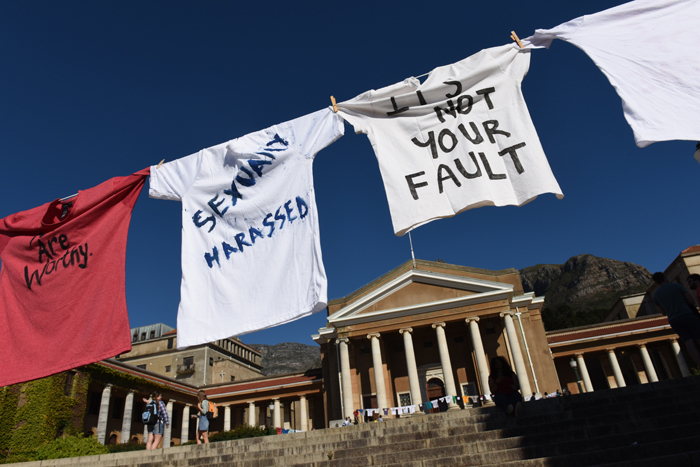Campus rape: Silence isn't going to cut it
10 June 2016 | Story by Newsroom
Rape culture pervades university life, but it can be eradicated if reflection replaces self-preservation
Rape culture, a term coined as recently as the 1970s, survives on our campuses and in other places because, like any other culture, it has found itself custodians. These are people who, consciously or subconsciously, protect and defend rape culture through their actions, attitudes and behaviours; they blame victims, normalise sexual violence and incriminate those trying to prevent sexual assault.
In every culture, you are likely to find two groups: those who abhor the behaviour and do everything in their power to expose its ills and denounce it, and those who have power, but remain silent, hoping that the former group will accept things as they are.
The latter group is the custodian of culture. Unfortunately, we find members of this group at universities, hence the rampant culture of rape.
One can only speculate why those who have power do little to mitigate rape. They remain silent and don't put adequate resources and functional structures in place.
Simple actions such as making public statements on sanctions to be meted out to offenders can go a long way towards reducing acts of sexual infringement that include unwanted attention, sexual coercion, intimidation, rape jokes, physical and sexual assault, as well as nonconsensual sexual contact.
The negative effects of rape at the personal and other levels have been exposed and demands for change made over the past few months, through protests. A look at a few demands from protesters at one campus shows that it is possible to diminish rape culture if those in power and control of resources have a will to act.
Rape culture on our campuses is like a taproot that has grown deep and developed multitudes of lateral roots to anchor itself.
These are illustrated in what I have heard, observed and experienced as a researcher, academic, warden and a woman living in a university residence. I have heard senior female students advising younger students to “wear a female condom whenever you go out where there will be guys and drinking on campus and anywhere else. At least you will know that, if you get raped, you will not contract HIV.”
Reflecting on and interpreting this well-meant advice, one can conclude that female students are in constant fear of being raped on campus, a space meant for learning and personal development. They adopt selfprotecting strategies because this space is perceived as an unsafe one. These strategies are passed down from one generation of students to the next to shield them from sexual violence.
On several occasions, I have found myself defending why I do research and include male students in workshops on sexual violence.
I have had to respond to questions such as: “So, what do you hope to achieve by doing this kind of research?” These questions have come from male and female colleagues who are researchers in their own right and know the merits of research, especially in informing the development of sustainable prevention interventions. Having to justify my work and research on sexual violence to other academics confirms the depth of the taproot of rape culture in the campus community.
The questions could be legitimate because previous initiatives to address social problems on campus have failed (I wonder whether such questions would be posed to a researcher on smoking among youth). Although meant well, the questions show hopelessness and acceptance of rape culture as a norm.
We all have a role to play in preventing sexual violence on our campuses. We can start by reflecting on how our everyday conversations, behaviours and attitudes reinforce or normalise it, thus feeding into the taproot of rape culture. Failure to do so means we are responsible for preserving it.
Reducing sexual violence is possible; it is only a matter of choice.
Opinion Sinegugu Duma – originally published in the Mail & Guardian. Photo Michael Hammond.
Read related stories:
- One in three young South Africans are sexually abused
Released: 9 June 2016 - #UCTSpeaksBack tables demands
Released: 12 May 2016 - 'Institutional response to sexual violence is disempowering to victims'
Released: 7 May 2016 - UCT Survivors voice their concerns about sexual assault on campus
Released: 22 March 2016
 This work is licensed under a Creative Commons Attribution-NoDerivatives 4.0 International License.
This work is licensed under a Creative Commons Attribution-NoDerivatives 4.0 International License.
Please view the republishing articles page for more information.










